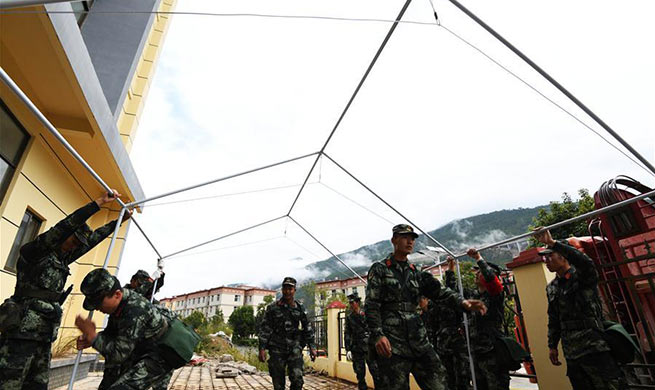by Xinhua writer Qu Junya
BEIJING, Oct. 15 (Xinhua) -- The United States' ongoing smear campaign against China is rather sweeping, stretching from real-world fabrications to cyber-space concoctions.
In an unusually ferocious tirade delivered earlier this month at a conservative think tank in Washington, U.S. Vice President Mike Pence once again portrayed China as a cyber security threat, groundlessly accusing Beijing of scheming cyber attacks against the United States.
The United States has kept cooking up such charges against China over recent years, regardless of the fact that it is an unrivaled cyber superpower, home to Internet founders, most of the core infrastructure, and major suppliers of key technologies.
More ironically, it has the world's largest cyber intelligence organization and first institutionalized cyber force, and it houses what is widely believed to be the strongest stronghold of hackers.
The 9-year-old Cyber Command is one of the 10 Unified Combatant Commands of the U.S. Department of Defense, armed with cyber offensive strategies and operating more than 130 cyber mission teams.
Yet just like in the real world, the superpower likes playing victim in the cyber space. The United States, a cyber predator that has a notorious record of violating other countries' interests and rights, keeps claiming that it is prey to cyber attacks launched by other countries.
And it has a rather thick skin for it. Edward Snowden's eye-popping revelations about U.S. bugging project PRISM, which targeted leaders of even American allies, WikiLeaks' exposure of the Central Intelligence Agency's capabilities to hack into smart devices worldwide, and the havoc wreaked by the WannaCry ransomware, which exploited leaked U.S. hacking tools, have all failed to shame Washington into stopping its hypocritical trick.
Then what is Washington up to? It is not hard to see that there are at least two ulterior motives behind the United States' obsession with demonizing China in the cyber space.
First, by hyping so-called cyber security threats from other countries, Washington attempts to shift worldwide attention away from its own cyber capacity and bullying history, and, more importantly, to make excuses for further cyberspace military buildup.
Second, by slandering Chinese enterprises and their products, like Huawei smart phones and DJI drones, Washington contrives to stir up Sinophobia in other countries so as to browbeat or hoodwink them into blocking Chinese competitors and saving the market for U.S. companies.
The cyber space is tremendously complicated, permeated with various new challenges. Thus it needs all parties to be responsible and constructive and carry out coordinated efforts and joint governance.
China, itself a victim of cyber attacks, has made its stance on cyber security clear. The Chinese government does not engage in any form in any cyber theft of commercial secretes, nor does it encourage or support anybody doing it. And it is ready to work with the international community to curb hacking attacks and other criminal activities in the cyber space.
From cooperating against cyber crimes to sharing information, China has demonstrated ample good faith in promoting cyber security cooperation with the United States. For the sake of all countries sharing the cyber space, now it is time for Washington to stop throwing false blames and start engaging in some genuine teamwork.













